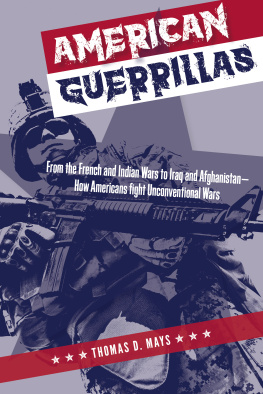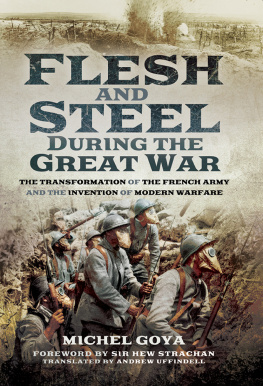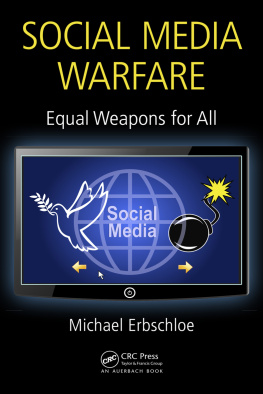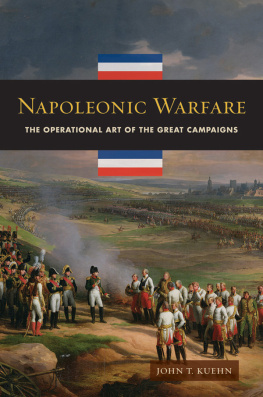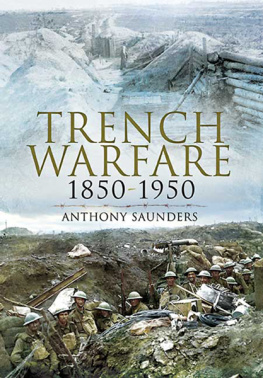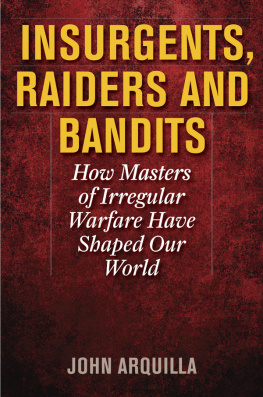Thank you for buying this ebook, published by NYU Press.
Sign up for our e-newsletters to receive information about forthcoming books, special discounts, and more!
Sign Up!
About NYU Press
A publisher of original scholarship since its founding in 1916, New York University Press Produces more than 100 new books each year, with a backlist of 3,000 titles in print. Working across the humanities and social sciences, NYU Press has award-winning lists in sociology, law, cultural and American studies, religion, American history, anthropology, politics, criminology, media and communication, literary studies, and psychology.
Under the Shadow of Napoleon
WARFARE AND CULTURE SERIES
General Editor: Wayne E. Lee
A Rabble in Arms:
Massachusetts Towns and Militiamen during King Philips War
Kyle F. Zelner
Empires and Indigenes: Intercultural Alliance,
Imperial Expansion, and Warfare in the Early Modern World
Edited by Wayne E. Lee
Warfare and Culture in World History
Edited by Wayne E. Lee
Rustic Warriors: Warfare and the Provincial Solider
on the New England Frontier, 16891748
Steven C. Eames
Forging Napoleons Grand Arme: Motivation, Military Culture, and
Masculinity in the French Army, 1800-1808
Michael J. Hughes
Under the Shadow of Napoleon: French Influence on the
American Way of Warfare from the War of 1812 to the Outbreak of WWII
Michael A. Bonura
Under the Shadow of Napoleon
French Influence on the American Way of Warfare from the War of 1812 to the Outbreak of WWII
Michael A. Bonura
NEW YORK UNIVERSITY PRESS
New York and London
www.nyupress.org
2012 by New York University
All rights reserved
References to Internet websites (URLs) were accurate at the time of writing. Neither the author nor New York University Press is responsible for URLs that may have expired or changed since the manuscript was prepared.
Library of Congress Cataloging-in-Publication Data
Bonura, Michael A., 1974
Under the shadow of Napoleon : French influence on the American way of warfare from the
War of 1812 to the outbreak of WWII / Michael A. Bonura.
p. cm. (Warfare and culture series)
Includes bibliographical references and index.
ISBN 978-0-8147-0942-9 (cl: alk. paper)
ISBN 978-0-8147-2317-3 (ebook)
ISBN 978-0-8147-0943-6 (ebook)
1. Military art and science United States History 19th century.
2. Military art and science United States History 20th century.
3. Military art and science France History 18th century.
4. United States History, Military 19th century.
5. Untied States History, Military 20th century.
6. France History Revolution, 1789-1799 Influence. I. Title.
UA23.B714 2012
355.477309034 dc23 2011047738
New York University Press books are printed on acid-free paper, and their binding materials are chosen for strength and durability. We strive to use environmentally responsible suppliers and materials to the greatest extent possible in publishing our books.
Manufactured in the United States of America
10 9 8 7 6 5 4 3 2 1
To Kyra,
who played with her Napoleon puppets beside my desk in solidarity
Contents
Figures
Acknowledgments
Many individuals and institutions helped in writing this book, and I am deeply indebted to all of them. I would like to thank Dr. Donald D. Horward for introducing me to the Napoleonic era and mentoring me as a Napoleonic historian. I would also like to thank Dr. Fritz Davis for becoming my major professor and seeing me through my Ph.D., guiding me through the history and philosophy of science, and introducing me to the works of Thomas Kuhn. Without them, I would not have been able to conceive of, much less finish, this book. I would also like to thank Colonel Kevin Farrell for his mentorship and friendship throughout this process; he has always ensured that I live up to my full potential. Dr. Jonathan Gumz provided incalculable help in outlining the scope of this work, and I have him to thank for making my argument as strong as it could be. Finally, I owe a huge debt of gratitude to Dr. Robert Citino, who encouraged me to go forward with this manuscript and offered important suggestions that led to its publication. Additionally, the West Point Special Collections provided invaluable help in research, both while I was teaching at the Military Academy and from a distance.
From the first word to the last revision, my family supported late nights and long days of research and writing and proofread several of the versions along the way. I could not have written this book without their support. I would also like to thank my wife, Kimberlee, who learned to appreciate the French influence on American warfare as much as I did, and without whom I would not be as successful as I am.
Introduction
Since the 1960s, Americans attitudes toward France have involved a wide array of emotions, from suspicion to anger and even, at times, betrayal. Frances withdrawal from the North Atlantic Treaty Organizations integrated military command in 1966 and its refusal to allow American military aircraft to enter its airspace during the 1986 bombing of Libya deteriorated the congenial American attitudes toward the French, which had been prevalent prior to World War II. The current global war on terror has not changed this opinion, and at times there has been a great deal of hatred of all things French. The Freedom Fries movement of 20012 that refused to use the word French when ordering fast food and the always popular jokes concerning the effeminacy of French arms are reminders of the animosity of Americans to all things French. A recent book titled Our Oldest Enemy: A History of Americas Disastrous Relationship with France, which received favorable reviews from the Wall Street Journal, documented the history of evil French machinations against America. However, this was not always the case. Across a broad spectrum of intellectual activity, America once considered France the model for a wide range of professions, including the profession of arms.
Consider this scene from the United States Military Academy at West Point: there is a small classroom of sixteen cadets and a single commissioned officer professor, in this case a major. The cadets listen attentively to the officer as he describes the movements of Napoleons Grande Arme from its victory over the unfortunate Austrian General Karl Mack at Ulm, to its subsequent pursuit of the Austrians and their Russian allies. The officer provides a quick summary of Napoleons strategic situation, his capabilities and constraints, and his plan to draw the army of the Third Coalition into a decisive battle. The cadets then analyze the French plan and the Allied response, identifying the importance of accurate intelligence for battlefield decisionmaking. The officer directs the cadets to the large-scale map of the battle of Austerlitz laid out on tables in the center of the classroom. The cadets each take an icon of either a French or Allied corps commander and describe the situation and actions of their respective icon, moving the pieces through the phases of the battle of Austerlitz. As the cadets brief their parts, the officer asks them to critique the performance of the French and Allied commanders and their decisions and to explain the causes of Napoleons greatest victory. The cadets respond with intelligent criticisms and offer their own unique solutions to the tactical problems presented by the battle of Austerlitz.



